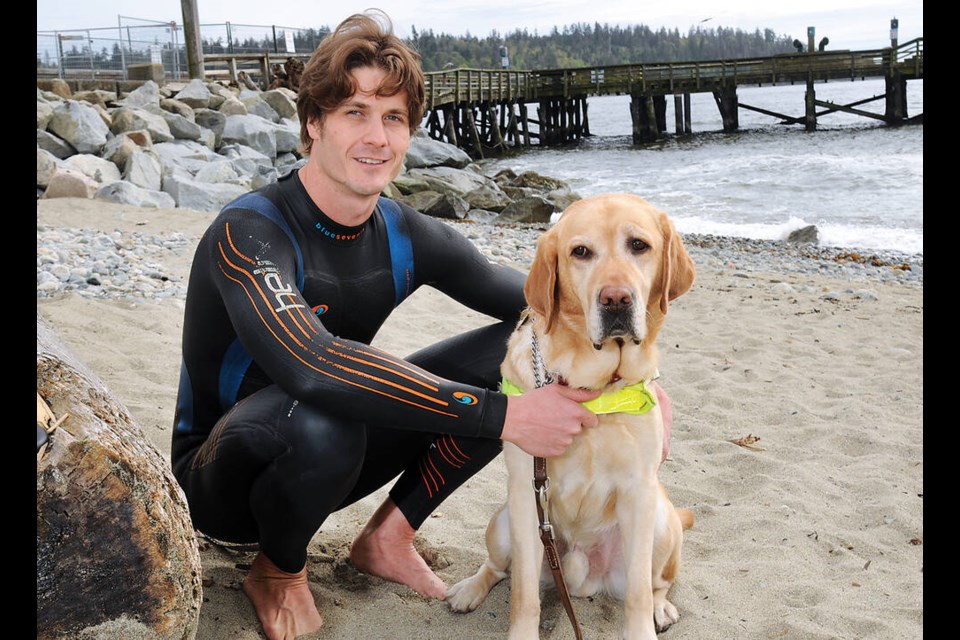A West Vancouver man now has the distinction of being the only blind person to swim across the Strait of Georgia.
Scott Rees entered the water off Davis Bay in Sechelt shortly after 6 a.m on Sunday, “a bit choked up” after reading a series of supportive comments compiled by Canadian Guide Dogs for the Blind.
The 40-year-old engineer was setting out to for the non-profit that provided him with Kaleb, the charming yellow lab who accompanies Rees everywhere. At a young age, Rees was diagnosed with retinitis pigmentosa, a recessive genetic condition that causes the rod and cone cells in his eyes to die off.
On Sunday a friend following in a kayak kept him on course during the swim, using a bone conduction radio headset. Every 45 minutes, Rees stopped to take on some calories and hydrate.
At about the half-way point, he hit a current that slowed his speed down by half, which it took him more than three hours to battle through.
“It was a long grind,” he said. “I never really felt like I was out of breath or out of gas but I felt like I was having mechanical breakdown problems with my arms.”
Rees persevered, kept moving by the thought of everyone who contributed to the Swim the Strait campaign. As he got within the last 300 metres or so of Nanaimo’s Pipers Lagoon Park, he could hear the cheers from friends and family on the beach being picked up through the radio.
“It gave me, definitely, a little lift and a nice little push to the end,” he said.
Just shy of 11 hours after he set out, Rees emerged onto the beach on Vancouver Island.
“Mission accomplished, I guess you’d say,” he said the day after the swim. “I’m pleased with the result and I’m feeling a bit proud that it went off the way it did and that it was a success.”
In training, Rees had never swum for more than five hours at a stretch, so he didn’t know how his body would react to the feat of endurance. Initially, he guessed it would take 10 to 12 hours and 25,000 strokes to make 30-kilometre crossing, but the finally tally was closer to 35,000 strokes.
“My shoulders are pretty cooked at the moment,” he said. “I have not had a swim that made me feel quite like this before.”
The sore muscles were clearly worth it though, in light of the smashing success of the campaign.
Canadian Guide Dogs
Kaleb was pleased to see his master back on dry land, but was mostly preoccupied by the fun of visiting the beach, Rees said. With Kaleb’s help, Rees can take the bus to his downtown office, get to the gym and meet friends for lunch.
There are several non-profits that provide guide dogs in Canada, but the wait can take years and the groups are almost totally reliant on donations to train and place dogs like Kaleb.
Initially, Rees hoped to raise $10,000. By the time he towelled off in Nanaimo, the campaign was at
Because of Rees and his team’s actions, there are pups being born now who will soon wind up at the side of someone like him, said Jeff Murphy, events co-ordinator for Canadian Guide Dogs for the Blind.
“We were obviously extremely grateful and just blown away at the level of support that he was able to tap into,” he said. “The amount of money that he’s raised is going to do a lot of good, helping multiple individuals to receive the same kind of care and support [Rees has]. It’s just an incredible, incredible way of giving back.”
As the campaign grew, Rees said he acquired a whole team of helpers from his boat crew to people assisting with spreading the word via social media. Thanks are owed to all of them, he said.
At a higher level, Rees said he hopes his story helps spur others to reconsider what they may be capable of when they put their mind to a task.
[email protected]





